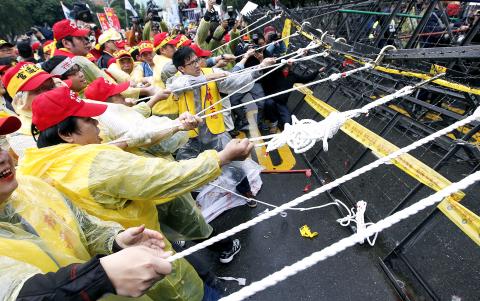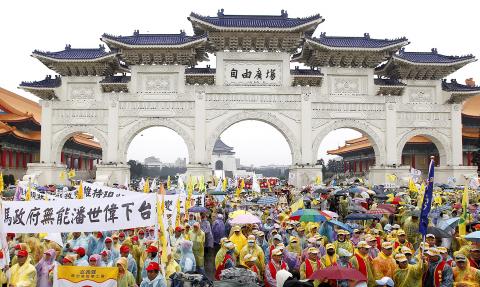|
Workers unite to
demand their rights
REFORM RESISTANCE: A multitude of protesters
voiced their discontent with the government, but their mutual concern was
preserving their pensions after retirement
By Loa Iok-sin / Staff Reporter

Protesters from labor unions use
ropes as they attempt to pull down barricades during a Labor Day protest in
front of the Executive Yuan building in Taipei yesterday.
Photo: REUTERS

Protesters from various labor
unions take part in a Workers’ Day protest in front of the Chiang Kai-shek
Memorial Hall in Taipei yesterday. Tens of thousands of people took to the
streets to protest the government’s recently announced national pension reform
plans.
Photo: REUTERS
Tens of thousands of workers took to the
streets of Taipei yesterday in Workers’ Day protests, calling on the government
to protect their rights.
The protesters called on the government to retain the current labor insurance
annuity payment, systematically raise the minimum wage, establish a system of
collective bargaining, allocate a budget to supplement the Labor Insurance Fund
if it fails to provide the basic guaranteed payments and amend Article 28 of the
Labor Standards Act (勞動基準法) to include doctors.
They also urged legislators across party lines to reject the Cabinet’s pension
reform plan — which proposes a higher premium rate and a lower income
replacement rate — so that workers can have basic retirement guarantees.
Singing The Internationale, the Laborers’ Fight Song and several other classic
songs of the labor movement, about 20,000 workers from unions and labor rights
advocacy groups across the country marched from outside the Legislative Yuan to
the Executive Yuan.
“Workers from different places and different industries are gathered here to
speak out about their discontent with the government,” march spokesman Han Shih-hsien
(韓仕賢) said. “Although different groups may have different complaints to make,
our collective concern is the labor insurance reform.”
As the Labor Insurance Fund is estimated to be broke within 20 years, the
government has decided on a reform plan that would ask those who are currently
employed to pay more in premiums, while cutting retirement payouts for those who
are retired.
“This so-called reform is a false reform, because it’s giving less protection
for workers in retirement,” Han said.
The demonstrators first rallied outside the Legislative Yuan and invited all
political party caucuses to promise that they would not support labor insurance
reforms that would actually damage the rights of retirees.
While the caucuses of the Democratic Progressive Party, the Taiwan Solidarity
Union and the People First Party all sent representatives to sign the promise,
the Chinese Nationalist Party (KMT) caucus turned down the invitation.
“The KMT has refused to even see us; they would not bow to workers. We will
teach it a lesson and make it bow to us,” Taoyuan County Confederation of Trade
Unions honorary chairman Mao Chen-fei (毛振飛) said.
The parade was largely peaceful, but tensions grew when demonstrators found that
only rows of barricades and police officers in riot gear awaited them as they
arrived in front of the Executive Yuan.
Using hooks and ropes, demonstrators tried to pull down the barricades, which
were chained together and nailed to the ground.
The police reacted by poking those who went near the barricades with long bamboo
poles. The conflict continued for about 10 minutes until Mao asked demonstrators
to stop, saying that several demonstrators were injured during the conflict.
Still upset, demonstrators chanted slogans calling on Premier Jinag Yi-huah
(江宜樺) to come out to meet them, but the Executive Yuan did not respond to the
call.
Meanwhile, protesters in another march organized by eight major labor
associations also expressed opposition to what they called the government’s
improper pension reforms.
The organizers said the real wage has been lowered to the level of 18 years ago,
while the pension reform plan is set to deduct even more of workers’ earnings
and will not only increase the labor insurance premium rate, but also other fees
by 20 percent.
Separately yesterday, President Ma Ying-jeou (馬英九) called for more understanding
of the government’s pension reforms and said the government will continue to
communicate with workers to protect their rights.
“President Ma understands workers’ concerns about the pension reform plan and
wishes them to know that the labor pension reforms seeks to strengthen the
financial structure of the Labor Insurance Fund for future generations,”
Presidential Office spokesperson Lee Chia-fei (李佳霏) said.
“President Ma said that rallies reminded the government of what it can do
better. The government will keep the laborers’ wishes in mind,” Lee added.
Additional reporting by Mo Yan-chih and CNA
|
![]()
![]()
![]()